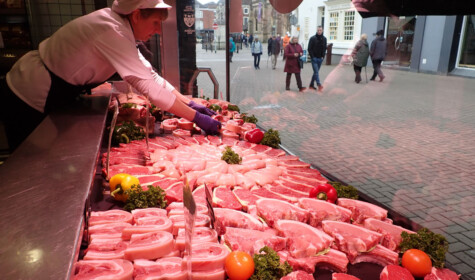Yesterday at Groundswell, our panel of small abattoir experts shared exciting news, inspiring stories and key asks for a new government.
The session was opened and chaired by Sustainable Food Trust Executive Director, Adele Jones, who set the issues in the context of the upcoming general election. Adele highlighted Labour’s pledge to reach 50% local food procurement, which would be impossible without small abattoirs. Adele also praised the Defra team led by John Powell who have been working on small abattoir issues.
Chair of the Abattoir Sector Group and small abattoir owner, John Mettrick outlined the major fund achievements, including the £4 million Smaller Abattoir Fund for capital grants to existing abattoirs, and the new abattoir fund aimed at setting up abattoirs in areas that are devoid of services. In addition, he outlined other successes: “The Abattoir Sector Group has been working extremely hard to alleviate pressures. We’ve got the bureaucracy reduced to make paperwork more simple, we’re pushing for the 5% rule to make veterinary attendance less onerous, and pushing for the ‘Over Thirty Months Rule’ to be relaxed.
“One key ask from government is legislative change. We keep hearing about flexibility within existing regulations but this has been done to death. We want risk based proportional regulation that ensures safety of food and also means you don’t have to be large, to be in the sector. We want young people to see a future in the industry.”
He went on to outline the potential for use of remote inspection technology and the up-skilling of abattoir staff to take on some of the work currently carried out by a vet. This would alleviate pressure on the veterinary industry, ensure the work vets carry out is commensurate with their qualifications, and improve the relationship between abattoir and regulator.
Devon farmer, Andy Gray, said, “John Powell and team have been spectacularly helpful. There is appetite to move the agenda forward.”
He called Jane Parker’s Moveable Slaughter Unit at Fir Farm a “beacon of hope”. He said, “The MSU has been a great way to shake up the way we think of the whole process, it’s been a useful leader when talking to Defra and shows you can actually do this. You discover the bottlenecks and opportunities.”
He also explained the MSU offers people the opportunity to work out whether a slaughterhouse is something they can have and use before they commit to a bricks and mortar building: “The MSU allows people to ‘flirt’ with slaughter and find out whether it’s for them!”
This is something the Isle of Wight will be embarking on, first using the Fir Farm MSU before building their own new small abattoir.
Isle of Wight NFU Chair, Robyn Munt, said, “There’s never been so much interest in local food culture, circular economy and wanting to add value. But this has been limited by lack of slaughter.”
She emphasised the importance of choice, which a lot of businesses don’t have.
“Access to an abattoir would allow us to spread risk. The market doesn’t work if you’re only selling to one or two people, you have to have multiple buyers.”
Currently, producers must book their slot on the fortnightly lorry to go to the mainland for slaughter. However, with only one haulier, this is vulnerable. Recent ill health meant the lorry did not run for a month.
Robyn said, “We want to control our story better, we want to grow and build businesses. We’ve had fantastic support from the Sustainable Food Trust and Jane Parker with the MSU.
“We need to judge the throughput and demand. We have an opportunity to do a phased approach. Becoming a hub for the MSU allows us to test. Often, people have to build a facility and hope it’s right, but it could be too big or too small and then is not sustainable.
“The Abattoir Sector Group has given the opportunity to learn from each other. We are all different but the obstacles are the same.”
Jonty Brunyee provided an update on the Save Long Compton Abattoir Campaign, which was set up following the announcement of Long Compton’s closure earlier this year. He said: “Within three weeks of starting the campaign we had 300 people willing to invest. Only a third were farmers. We had interest from people in London, consumers, retailers, even people from America. We are hoping to buy Long Compton in the next 2-3 weeks. But if we don’t reach the final figure we want, we will pull out and build a new one.”
Alongside the abattoir, he outlined visionary plans for a butchery and adding a value academy and retail outlet.
Adele closed the panel by asking anyone who is interested in the government funding or in setting up an abattoir, to get in touch. The Abattoir Sector Group will be working with Defra to identify potential new abattoirs.
For more information on the work of the Sustainable Food Trust and Abattoir Sector Group please see the attached update here or please contact:
Megan Perry
Head of Policy and Campaigns, Sustainable Food Trust
07761 804341
megan@sustainablefoodtrust.org
Featured image taken at Walter Smith butchers in the West Midlands. Credit to M. Kunz.


